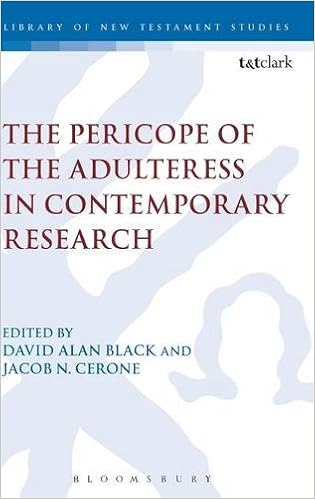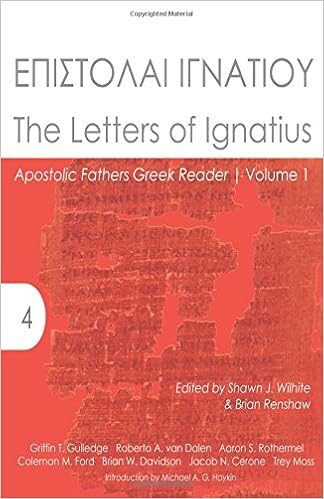This morning I was reading through Genesis 4–5 in the LXX and noticed something small that I thought I might point out. Here is the quotation with the relevant portions bolded:
Αὕτη ἡ βίβλος γενέσεως ἀνθρώπων· ᾗ ἡμέρᾳ ἐποίησεν ὁ θεὸς τὸν Ἀδάμ, κατʼ εἰκόνα θεοῦ ἐποίησεν αὐτόν· 2 ἄρσεν καὶ θῆλυ ἐποίησεν αὐτοὺς καὶ εὐλόγησεν αὐτούς. καὶ ἐπωνόμασεν τὸ ὄνομα αὐτῶν Ἀδάμ
זֶ֣ה סֵ֔פֶר תּוֹלְדֹ֖ת אָדָ֑ם בְּי֗וֹם בְּרֹ֤א אֱלֹהִים֙ אָדָ֔ם בִּדְמ֥וּת אֱלֹהִ֖ים עָשָׂ֥ה אֹתֽוֹ׃
זָכָ֥ר וּנְקֵבָ֖ה בְּרָאָ֑ם וַיְבָ֣רֶךְ אֹתָ֗ם וַיִּקְרָ֤א אֶת־שְׁמָם֙ אָדָ֔ם
This is the book of the generation of humankind, in which day God made Adam according to the image of God he made him: male and female he made them. And he blessed them. And he named their name adam.
This is the book of the generations of Adam/adam, in the day God created Adam/adam, in the image of God he made him: male and female he created them. And he blessed them. And he called their name adam.
Wordplays like this open up a number of interpretive possibilities. Often, modern translations offer footnotes to make the reader aware of the options. For instance, the ESV reads “And he called their name man (fn: Adam).”
The LXX translator, however, chooses among the options available and translates accordingly. In the first use of אדם (Adam, man, humankind), the translator uses ἀνθρώπων (humankind, men). In so doing, he transforms MT Genesis from (potentially) Adam’s genealogy, to the genealogy of all mankind. Susan Brayford writes in her commentary on the LXX Genesis:
LXX-G also departs from MT by using the plural ‘humans’ (ἀνθρώπων), rather than the singular and unarticulated Adam (אדם). As such, LXX-G intends to present the origin of humans, rather than the descendants of Adam (257).
In the second use of אדם, the translator simply transliterates the word, presumably as a representation of Adam’s name. The similar use of language in Genesis 5 to that of Genesis 1 suggests the translator recalls God’s specific creation of Adam (Brayford, 257).
The third and finally use of אדם in this selection is also transliterated. It is unlikely that the transliteration represents the proper name Adam. Instead, it most likely refers to the meaning of אדם as “man” or “humankind.” Whereas the translator felt it necessary to clarify that the genealogy was of all humankind, he does not feel the need to clarify that אדם refers to ἄνθρωπος (man, humankind) here. It would seem that the translator relied upon his reader’s familiarity with the meaning of Ἀδάμ.
The choices a translator must make when communicating the source language into the target language fascinates me. Often, many of these changes are subconscious; Sometimes they are intentionally. In either case, connections in the original text are altered. In these cases, though the meaning of the passage is affected minimally, the texture and nuances of the original are lost.









This translation may well have led to the belief by some that the man Adam was initially a bi-gendered creature, an androgyne, being both male and female.
That would be one interesting take on the passage for sure, and prohibitive—at least I would think—considering the presence of αὐτοῦ and αὐτῶν in “he blessed them. And he named them the name.” I would be interested, if you have the sources, in seeing how the passage was interpreted by the Patristics. Maybe research for another time.
Jacob,
I’m not stating it’s a legitimate interpretation, but this belief is in Jewish mysticism, Christian mysticism, pseudo-Christian mysticism, etc. While recognizing that wikipedia is not a ‘proper’ reference, the following can provide an idea (see Midrash, Other Christian Sects, and Gnosticism sections):
http://en.wikipedia.org/wiki/Adam_Kadmon
This particular belief has traction in modern day esoteric beliefs.
I didn’t think you were saying that it was :). Also, thanks for the references as this is new to me!
Jacob,
Ah, tone is so very hard to convey in the written word at times! 🙂 What I meant specifically is that others misinterpret Scripture, and I think at times purposely so, in order to put forth a particular belief. I admit that when I first heard of this concept of Adam as an androgyne I was taken aback, but having studied this at some length I see the thought is pervasive (it’s in The Gospel of Thomas, implied in The Gospel of Philip, e.g.). Suffice to say, without going too far astray from your post, that this idea has many different ramifications in today’s society.
I will be on the look out for it when I finally find the time to pick up my Coptic Grammar. The critical edition of the Gospel of Thomas is sitting on my shelf being neglected.
Too many books, too little time!
Too true.
Seems like the translator of the Vulgate does something similar:
et vocavit nomen eorum Adam
Notice that the LXX and the Vulgate translators first decide to transliterate אדם (respectively as Αδαμ and as Adam) in different places:
Looks like I stumbled into something much bigger than a simple translate vs. transliterate issue. Have you looked into developing your work into a paper? It looks like it would be a complex and fascinating study.
Thanks for the question. Well, not yet have we published much in a paper, but my co-bloggers and others do appreciate the conversations around these issues. Yes, they are big issues when sexuality and gender enter into Bible translation questions especially.
One of my co-bloggers has this post up not unrelated:
Pingback: LXX: DIFICULTADES DE TRADUCCIÓN EN GÉNESIS 5:2 | EL BLOG DEL APOLOGISTA CRISTIANO/ INGº. MARIO OLCESE SANGUINETI (LIMA/PERÚ)